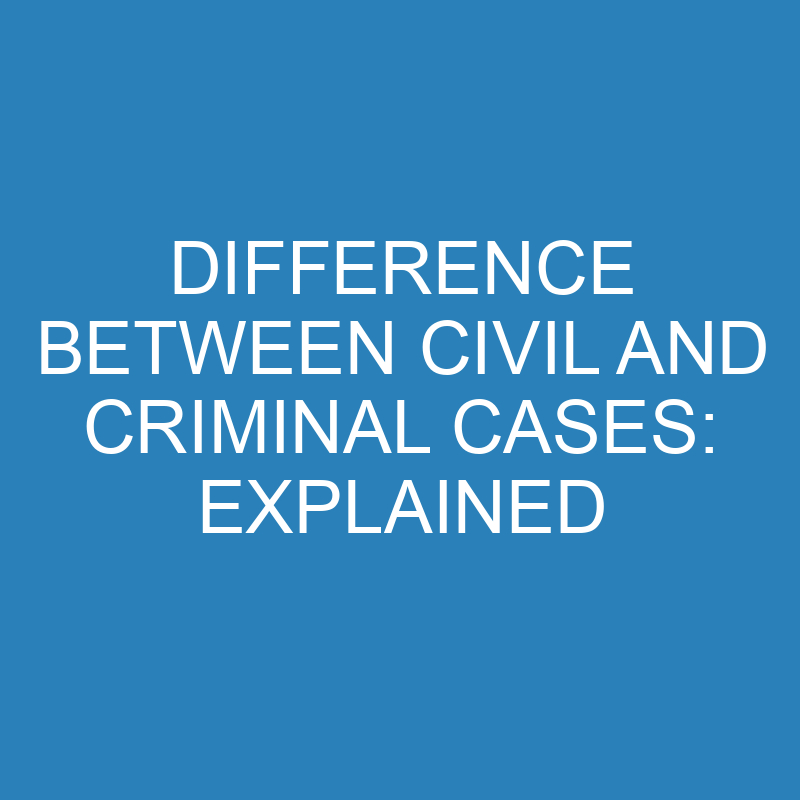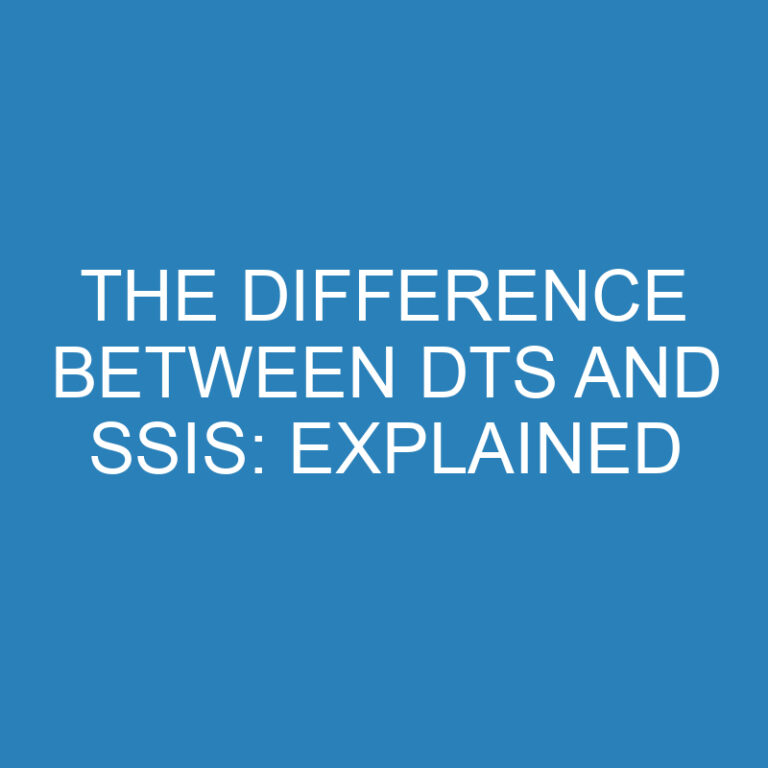
Are you wondering about the difference between civil and criminal cases? It’s a common question, and in this article, I’ll provide you with a clear understanding of these two types of legal proceedings. Whether you’ve seen them mentioned in news headlines or have encountered them personally, it’s important to know how civil and criminal cases differ.
Let’s start by defining civil cases. Simply put, civil cases involve disputes between individuals or entities that typically seek compensation for damages or resolution of a conflict. These cases can cover a wide range of issues such as personal injury claims, contract disputes, property disputes, or even divorce proceedings. In a civil case, the burden of proof is usually lower than in criminal cases.
On the other hand, criminal cases are brought by the government against an individual or entity accused of committing a crime. The primary purpose here is not to seek compensation but rather to punish the offender for their actions. Criminal offenses can include crimes like assault, theft, murder, or drug trafficking. In criminal trials, the burden of proof lies with the prosecution who must prove “beyond a reasonable doubt” that the defendant committed the crime.
In conclusion, understanding the difference between civil and criminal cases is essential for navigating our legal system effectively. While civil cases focus on resolving disputes and seeking compensation through lawsuits between individuals or entities, criminal cases deal with prosecuting individuals accused of committing crimes under state laws. Stay tuned as we delve deeper into each type throughout this article!
Definition of Civil Cases
When it comes to the legal system, it’s essential to understand the difference between civil and criminal cases. In this section, we’ll delve into the definition of civil cases and shed light on their key characteristics.
Civil cases are disputes between individuals or entities that typically involve private matters rather than crimes committed against society as a whole. These cases revolve around seeking remedies for perceived wrongs or enforcing rights established by law. Unlike criminal cases where the government prosecutes alleged offenders, civil cases are initiated by individuals or organizations known as plaintiffs.
In civil litigation, the plaintiff seeks resolution through a court process in order to obtain compensation for damages suffered, enforce contracts, resolve property disputes, or seek injunctive relief. The goal is not punishment but rather rectifying harm caused by another party’s actions or negligence.
One notable aspect of civil cases is that they can cover a wide range of issues such as personal injury claims, employment disputes, family law matters like divorce and child custody battles, contract breaches, property disputes, and more. The variety of topics addressed in civil litigation reflects the diverse nature of conflicts arising within society.
Another distinguishing factor is the burden of proof required in civil cases compared to criminal ones. In a civil case, the burden rests on the plaintiff who must demonstrate their claim is more likely true than not true (a preponderance of evidence). This standard is less demanding than beyond a reasonable doubt used in criminal trials.
Additionally, unlike criminal proceedings which can result in jail time or probation if found guilty, civil cases generally focus on providing monetary compensation or specific performance remedies. However, it’s worth noting that some civil lawsuits may lead to injunctions preventing certain actions or requiring parties to fulfill specific obligations.
Understanding the definition of civil cases helps us appreciate how they play an integral role in our legal system by offering recourse for individuals seeking justice and resolution outside of criminal prosecution. As we explore further sections of this article, we’ll continue to unravel the intricacies and differences between civil and criminal cases. Stay tuned!
Examples of Civil Cases
Let’s delve into some examples of civil cases to gain a better understanding of how they differ from criminal cases. Remember, civil cases involve disputes between individuals or organizations, often seeking compensation for damages or resolution of a legal issue. Here are a few common scenarios:
- Personal Injury Claims: In civil litigation, personal injury cases are quite prevalent. These arise when someone is injured due to the negligence or intentional actions of another party. For instance, imagine a scenario where a person slips and falls in a grocery store due to a wet floor that wasn’t properly marked. The injured individual may file a civil lawsuit against the store owner seeking compensation for medical expenses, pain and suffering, and lost wages.
- Breach of Contract: Another frequent type of civil case involves breaches of contract. This occurs when one party fails to fulfill their obligations as outlined in an agreement with another party. Let’s say you hire a contractor to remodel your kitchen but they fail to complete the work within the specified time frame or deliver it up to standard as agreed upon in the contract terms. In such situations, you may pursue legal action against the contractor seeking damages.
- Employment Discrimination: Civil cases also arise from employment-related issues such as discrimination claims. If an employee believes they have been treated unfairly based on factors like race, gender, age, religion, or disability status, they can file a lawsuit against their employer alleging discrimination. The aim here is not only to seek financial compensation but also to hold employers accountable for discriminatory practices.
- Property Disputes: Disagreements over property rights can lead to civil lawsuits as well. For example, let’s say two neighbors have conflicting boundary lines regarding their properties that result in encroachments and conflicts over land use rights like easements or access roads. To resolve these disputes and establish clear ownership boundaries, parties may turn to civil litigation.
- Defamation: Defamation cases involve harm caused by false statements that damage a person’s reputation. If someone spreads malicious falsehoods about you, resulting in harm to your personal or professional life, you can file a civil lawsuit against them seeking compensation for the damage caused.
These are just a few examples of civil cases, highlighting the diverse range of legal issues that can be addressed through civil litigation. By understanding these examples, we can better grasp the scope and importance of civil law in our society.
Definition of Criminal Cases
Criminal cases, in the realm of law and justice, involve offenses committed against society as a whole. These cases typically arise when an individual is accused of violating criminal laws enacted by the government. Unlike civil cases that deal with disputes between individuals or organizations, criminal cases are brought by the government through its prosecuting authorities.
In a criminal case, the focus is on determining whether the accused party is guilty beyond a reasonable doubt. The burden of proof lies with the prosecution to present evidence that convinces a judge or jury of the defendant’s guilt. If found guilty, the accused may face penalties such as imprisonment, fines, probation, or even capital punishment depending on the severity of the offense.
One key distinction between civil and criminal cases is that criminal cases involve actions considered harmful to society as a whole. Crimes such as murder, theft, assault, fraud, and drug trafficking fall under this category. The purpose behind prosecuting these offenses is not only to punish wrongdoers but also to maintain social order and protect public safety.
Another significant aspect of criminal cases is that they often involve investigations conducted by law enforcement agencies. These investigations aim to gather evidence and build a solid case against the accused party. Police officers might collect witness statements, forensic evidence like DNA samples or fingerprints, surveillance footage or other forms of evidence that can be presented during trial.
It’s important to note that in criminal cases, victims do not have direct control over whether charges are filed or dropped against an alleged offender. Instead, it falls upon prosecutors employed by governmental bodies (such as district attorneys) who make decisions based on available evidence and public interest in pursuing legal action.
Understanding the definition of criminal cases helps us grasp their significance within our legal system. By distinguishing them from civil matters and recognizing their societal impact and purposeful investigation process, we gain insights into how these cases serve justice for both individuals involved and society at large.
Examples of Criminal Cases
When it comes to criminal cases, there are various types that can occur within the legal system. These cases involve offenses against public order and safety, and they are typically prosecuted by the government. Here are some examples of criminal cases:
- Murder: One of the most serious crimes, murder involves unlawfully causing the death of another person with intent or through reckless behavior. Whether premeditated or committed in the heat of the moment, murder cases often require extensive investigation and evidence gathering.
- Robbery: This crime entails taking someone’s property by force or threat of force. Robbery cases may involve bank hold-ups, muggings on the street, or even home invasions. The severity of punishment depends on factors such as whether a weapon was used and if anyone was injured during the incident.
- Drug Trafficking: Criminal cases involving drug trafficking revolve around distributing illegal substances such as cocaine, heroin, marijuana, or methamphetamine for profit. These cases can range from street-level dealers to large-scale operations spanning multiple regions.
- Assault: Assault refers to intentionally causing harm or physical injury to another person without their consent. It can be categorized as simple assault if it causes minor injuries or aggravated assault if it results in severe harm or involves weapons.
- Fraud: Fraudulent activities encompass a wide range of criminal acts aimed at deceiving others for personal gain. Examples include identity theft, credit card fraud, insurance fraud, and securities fraud.
- Burglary: Burglary occurs when an individual enters a building unlawfully with the intention to commit a crime inside it (such as theft). This offense is distinct from robbery since it does not involve direct confrontation with victims.
- Sexual Assault: Sexual assault encompasses non-consensual sexual acts committed against another person by force or coercion. These charges cover offenses like rape, sexual abuse, indecent exposure, and child molestation.
It’s important to note that these examples are not exhaustive, as criminal cases can vary widely depending on jurisdiction and specific circumstances. Each case is unique and requires careful examination of evidence, witness testimonies, and legal arguments to determine guilt or innocence. Understanding the different types of criminal cases helps shed light on the complexities of the legal system and its pursuit of justice.
Differences Between Civil and Criminal Cases
When it comes to the legal system, there are two main types of cases: civil and criminal. While both involve disputes or conflicts that require resolution, they differ in several key aspects. Understanding these differences is crucial for anyone involved in or seeking information about the legal process.
- Nature of the Case:
- Burden of Proof:
- Potential Outcomes:
- Parties Involved:
- Legal Representation:
Understanding these differences between civil and criminal cases can help individuals navigate the legal system more effectively. Whether you’re involved in a dispute or simply seeking knowledge about how justice is administered, knowing these distinctions is essential.
Burden of Proof
Let’s dive into the concept of burden of proof, a crucial element that distinguishes civil and criminal cases. In both types of cases, the burden of proof rests on the prosecution or the plaintiff, but there are some key differences in how it is applied.
In criminal cases, where someone is charged with committing a crime, the burden of proof lies on the prosecution. The prosecution must prove beyond a reasonable doubt that the defendant is guilty. This means that all elements of the crime must be proven to such an extent that there can be no reasonable doubt in the minds of the jurors or judge. It’s a high standard designed to protect individuals from being wrongfully convicted.
On the other hand, in civil cases involving disputes between private parties, such as personal injury lawsuits or contract disputes, the burden of proof is generally lower than in criminal cases. In these situations, it’s usually enough for one party to establish their case by a preponderance of evidence. This means that they must present enough evidence to convince a judge or jury that their version of events is more likely than not true.
To put it simply, while criminal cases require proof beyond a reasonable doubt, civil cases only require proof by a preponderance of evidence. The reason for this distinction lies in the potential consequences: in criminal cases, individuals face loss of liberty if found guilty; whereas in civil cases, they may face financial liability or other forms of non-criminal punishment.
It’s worth noting that these standards can vary slightly depending on jurisdiction and specific circumstances surrounding each case. Additionally, certain types of civil cases may require higher burdens of proof due to their nature (e.g., clear and convincing evidence).
Understanding this distinction between burden-of-proof standards helps us appreciate why different evidentiary requirements apply to criminal and civil proceedings. By ensuring fair trials and promoting justice system integrity, these standards play an essential role in our legal system.
Parties Involved
Now let’s delve into the parties involved in civil and criminal cases. Understanding who is involved in these legal proceedings is essential for grasping the differences between them.
In a civil case, there are typically two main parties: the plaintiff and the defendant. The plaintiff is the individual or entity that initiates the lawsuit, seeking to resolve a dispute or seek compensation for damages. On the other side, we have the defendant, who is being sued by the plaintiff and must defend themselves against the allegations made.
The plaintiff could be an individual, such as someone who suffered personal injury due to negligence, or it could be a company suing another company over breach of contract. Similarly, defendants can range from individuals accused of causing harm to businesses facing accusations of unfair business practices.
In contrast, criminal cases involve different parties with distinct roles. The prosecution represents society as a whole and brings charges against an individual accused of committing a crime. They act on behalf of the government and aim to prove that the accused committed the offense beyond a reasonable doubt.
On the other side stands the defendant, who faces criminal charges brought by the prosecution. This can include crimes ranging from theft and assault to more serious offenses like murder or fraud. In criminal cases, defendants have specific constitutional rights designed to protect them during legal proceedings.
It’s important to note that unlike civil cases where monetary compensation may be sought, criminal cases focus on punishment for breaking laws established by society rather than providing restitution for individuals affected by wrongdoing.
Understanding these key players in civil and criminal cases helps shed light on why these legal processes differ in their objectives and outcomes. Whether you find yourself involved in such matters directly or are simply interested in learning about our justice system, knowing who’s involved is crucial for comprehending how justice is served.
Stay tuned as we continue exploring other aspects that differentiate civil and criminal cases!
Legal Consequences
When it comes to civil and criminal cases, the legal consequences can vary significantly. Let’s delve into the differences and understand the potential outcomes of each.
- Civil Cases: In civil cases, the goal is to resolve disputes between individuals or entities. The primary objective here is not punishment but rather compensation for any harm caused. Therefore, the legal consequences in civil cases typically involve financial remedies such as monetary damages or injunctions. For instance, if someone breaches a contract, the court may order them to pay compensation to the aggrieved party.
- Criminal Cases: On the other hand, criminal cases deal with offenses against society as a whole and aim to hold individuals accountable for their actions. The legal consequences in criminal cases are focused on punishment and rehabilitation. If found guilty, an individual may face imprisonment, fines, probation, community service, or even capital punishment depending on the severity of their crime.
- Burden of Proof: Another crucial distinction lies in the burden of proof required in each type of case. In civil cases, it’s usually “preponderance of evidence,” meaning that one party must convince the court that their version of events is more likely true than false. Conversely, in criminal cases, a much higher standard applies – “beyond a reasonable doubt.” This means that there should be no reasonable doubt regarding guilt based on all available evidence presented.
- Role of Government: Additionally, while both types of cases involve legal proceedings and can end up in courtrooms, they differ in terms of who initiates them. Civil cases are typically initiated by private individuals or organizations seeking resolution for personal grievances or rights violations. On the contrary, criminal cases are initiated by government authorities such as police or prosecutors acting on behalf of society to enforce laws and seek justice.
- Collateral Consequences: It’s important to note that apart from direct legal ramifications like fines or imprisonment, both civil and criminal cases may have collateral consequences. These consequences can include damage to one’s reputation, restrictions on future employment opportunities, loss of professional licenses, or even immigration issues for non-citizens.
Understanding the legal consequences of civil and criminal cases is crucial when navigating the judicial system. While civil cases focus on compensation, criminal cases prioritize punishment and rehabilitation. The burden of proof differs significantly between the two types of cases, and government authorities usually initiate criminal proceedings. It’s essential to consider both direct and collateral consequences when contemplating legal actions or defending oneself in court.
Conclusion
To wrap up, understanding the difference between civil and criminal cases is crucial in navigating the legal system. Here are the key takeaways from this article:
- Nature of Cases:
- Burden of Proof:
- Parties Involved:
- Potential Outcomes:
- Legal Representation:
- Double Jeopardy Protections:
- Public Interest vs Personal Interests:
In conclusion, understanding the differences between civil and criminal cases is essential for anyone involved in or affected by legal proceedings. Whether you find yourself in a situation where you need to file a lawsuit or are called as a witness, knowing the nuances of each type of case will help you navigate the legal system more effectively. Remember to consult with an experienced attorney who can provide guidance tailored to your specific circumstances.






